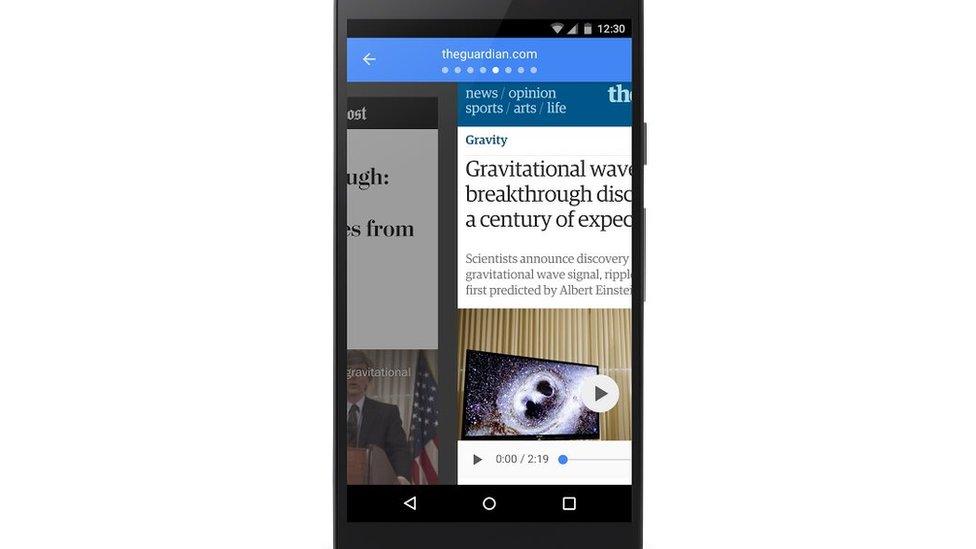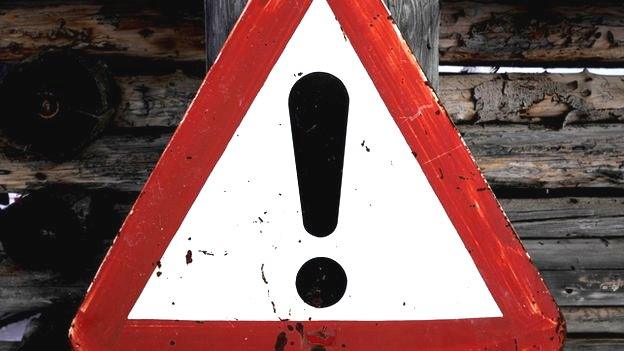Google promotes fast-loading AMP news articles
- Published

Many of the world's best known news publishers are taking part in the AMP initiative
Google has begun promoting web-based news articles that comply with its effort to make pages load more quickly on mobile devices.
Stories coded according to the Accelerated Mobile Pages (AMP) initiative's guidelines appear in a dedicated carousel in the firm's search results.
It says this will help the public find pages that load "blazingly fast".
However, it is likely to disadvantage sites that opt not to take part.
Google's chief executive Sundar Pichai also told an audience in Paris that his firm would offer to defend news organisations against distributed denial of services attacks.
DDoS attacks involve a perpetrator flooding a site with traffic to knock it offline, and often involve hijacked PCs to bolster the assault's force.
Battery-friendly
The AMP project was first announced last October, at which point "dozens" of sites said they were taking part.
Google has revealed that the list has since expanded to more than 160 news providers across Europe.

Google will present users with a carousel of stories at the top of relevant searches on their mobile devices
In addition, it said, other news sites in the US, Brazil, Japan, Indonesia and Mexico were taking part, and there were plans to extend AMP further soon.
Blogging platform Wordpress has also enabled its users to have their pages automatically translated into AMP-enabled pages, which could swell numbers further.
AMP pages load on smartphones and tablets between four and 10 times faster than those made in traditional HTML.
Once a user has read an article, they can flick to the side to see another publication's take on the same topic.
Much of the Javascript code normally used with the webpages is absent, meaning loading the articles should also use less battery power.
Publishers can continue to use paywalls and tap into the same ad networks as before, but they will not be able to display some types of adverts including pop-ups and "sticky" images that move as users scroll down a page.

Readers can flick from one publication's AMP article to another, which may challenge sites' efforts to keep visitors on their own pages
The effort acts as a disincentive to people who might otherwise have used ad-blockers to speed up loading times.
In addition, it helps Google deal with a threat from Facebook. The social network is promoting its own Instant Articles scheme, which makes third-party content appear more quickly by hosting it on Facebook's own servers.
The BBC is involved in both schemes.
"With over 65% of traffic to BBC News coming from mobiles or tablets, optimising this performance is crucial," said BBC executive Robin Pembrooke.
"Google AMP is another important step to help achieve this goal."
AMP is open source, meaning anyone can adopt the technology without having to seek Google's permission.
Because of the firm's dominance in search, organisations may feel compelled to join to avoid losing traffic.
DDoS shield
Mr Pichai also invited independent news organisations to join Project Shield without charge.
This is a scheme originally launched in 2013 to offer select organisations the same DDoS protection used by Google itself.
It works by using a technology called a reverse proxy, which lets Google identify and stop "bad traffic" before it reaches the news organisations' computers.
To enable this, news organisations will have to let Google see the data flowing to their sites.
Google says it will use the information only to protect them and will delete raw traffic logs a fortnight after each is created.

DDoS attacks involve overwhelming a target's computer servers with requests
DDoS attacks are an increasing threat to news sites. One attack briefly knocked the BBC's news site offline in December.
However, one expert suggested that bigger news organisations were likely to continue to manage their own security.
"Google's product doesn't offer the same level of customisation as commercial services, but its simplicity will be appreciated by smaller-scale organisations without specialist technical experts," said Dr Steven Murdoch from University College London.
"A potential side effect is that some countries might find it harder to censor the website without blocking all of Google's other services."
He added, however, that there was a risk that some legitimate users would be accidentally blocked, external.
- Published27 January 2016

- Published31 December 2015

- Published7 October 2015
